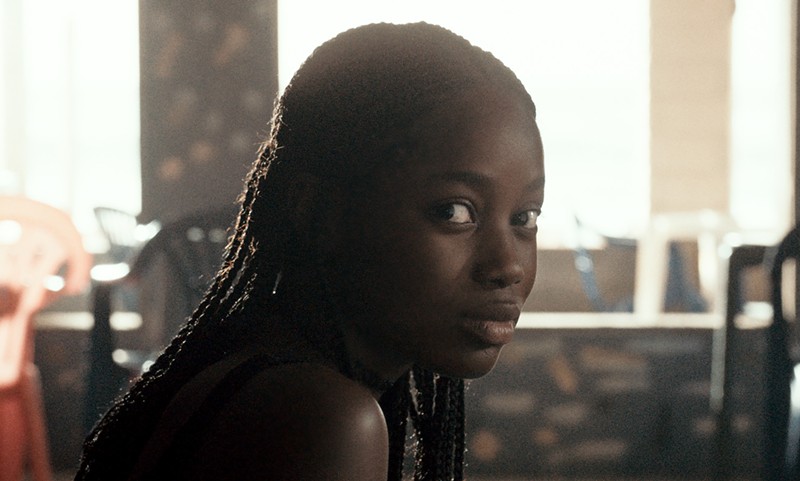Netflix's 'Atlantics' is a stunning debut from director Mati Diop set in Senegal
Opening on the misty construction site of a half-built skyscraper in Senegal, so modern in its design it seems to quaver with instability, Atlantics draws a bead on a cosmology of inherited social structures, class, and gender norms just waiting to be shaken. Though its thematic scope is broad, its narrative one is pointed and intimate, centering on the emotional world of a young woman named Ada (a terrific Mame Bineta Sane) and the fluctuations in her romantic and emotional life. Though in love with Souleiman (Ibrahima Traoré), a construction worker on the building site, she’s engaged by familial fiat to wealthy, tasteless Omar (a nigh-permanent Sunglass Guy and Certified Tool). Protesting the impending marriage to friends in private at the time we find her, it feels inevitable nonetheless, a force bearing down upon her that can’t be stopped.
Without revealing too much, I’ll say that the arrangement becomes somewhat complicated — much to the surprise of Ada, her parents, and those around her — and in a manner that creates a cascade of troubles that she strives to gain control over. Meanwhile, Souleiman’s MIA — gone early on with his coworkers out to sea by boat, in protest — searching for a better life after months of unpaid work.
The film’s romantic triangle is just a starting point for the increasingly surreal Atlantics, but its emotional reality provides both an anchor and a basis for elaboration; desire, defiance, and a sinuous but carefully controlled sensuality all guide its movements with an easy force. These same traits come through quite strongly in performance — Sane as Ada embodies all those qualities, echoing the film’s own strengths in her casual movements between spaces and moods. In this regard, there’s no question that director Mati Diop knows her territory; her knowledge of the port city of Dakar feels personal and essential, with locations ranging from apartments to a seaside, open-air club that feels immersive for its apparent fidelity to life. Even pillows on each bed feel thoughtfully selected, granting insight into characters and milieu. No character’s too small to offer up a point of view, and though Sane is Atlantics’ star, each member of the cast feels integrated finely, deserving of their roles.
Though the debut feature is clearly making the most of a modest budget, Atlantics radiates authority in every facet of its direction. With its gliding, ambient progression and understated (but often startling) swerves, Diop’s film is a work of surprising unity, moving at a measured pace that lets Ada’s feelings be its rudder, even as it’s highly structured. While emotive and a romance, the film never skews melodramatic or spins out of control, elaborating what characters or script can’t directly express at times via Fatima al Qadiri’s undulating, spectral electronic score. The result is a work that feels free to move and change while remaining tonally of a piece, able to shock at times without feeling for a moment false. Atlantics wouldn’t be itself directed any other way; it’s achieved something enviable, and quite final in artistic work: its truest possible self.
This solidity and consequent freedom are essential in letting Diop’s story move through the ground it has to cover, for the well from which Atlantics pulls proves deep, serene, and potent, fueled by a simmering anger that runs quietly throughout. The unpaid workers from its beginning prove to be more than just a backdrop, the hints of something inexplicable drifting through its narrative offer something better than an excuse for al Qadiri’s suggestive score. In Ada’s demeanor and the film’s subversions, there’s an air of quiet, growing insurrection, a will to rebel against centuries of inequality and norms taken too much for granted. Watching her conduct herself in argument or haggle in a market’s a pleasure, mostly for the feeling that she withholds or offers up exactly when she chooses to. Asserting herself against a friend, she repeats with stern insistence that she’s a “big girl” until she gets exactly what she wants. Seemingly repelled by societal rot just as much as Ada, Diop reshapes our world through force of will here into something romantic and harsh, but novel, a vision of what swirls around us more than just what we know.
Stay on top of Detroit news and views. Sign up for our weekly issue newsletter delivered each Wednesday.


